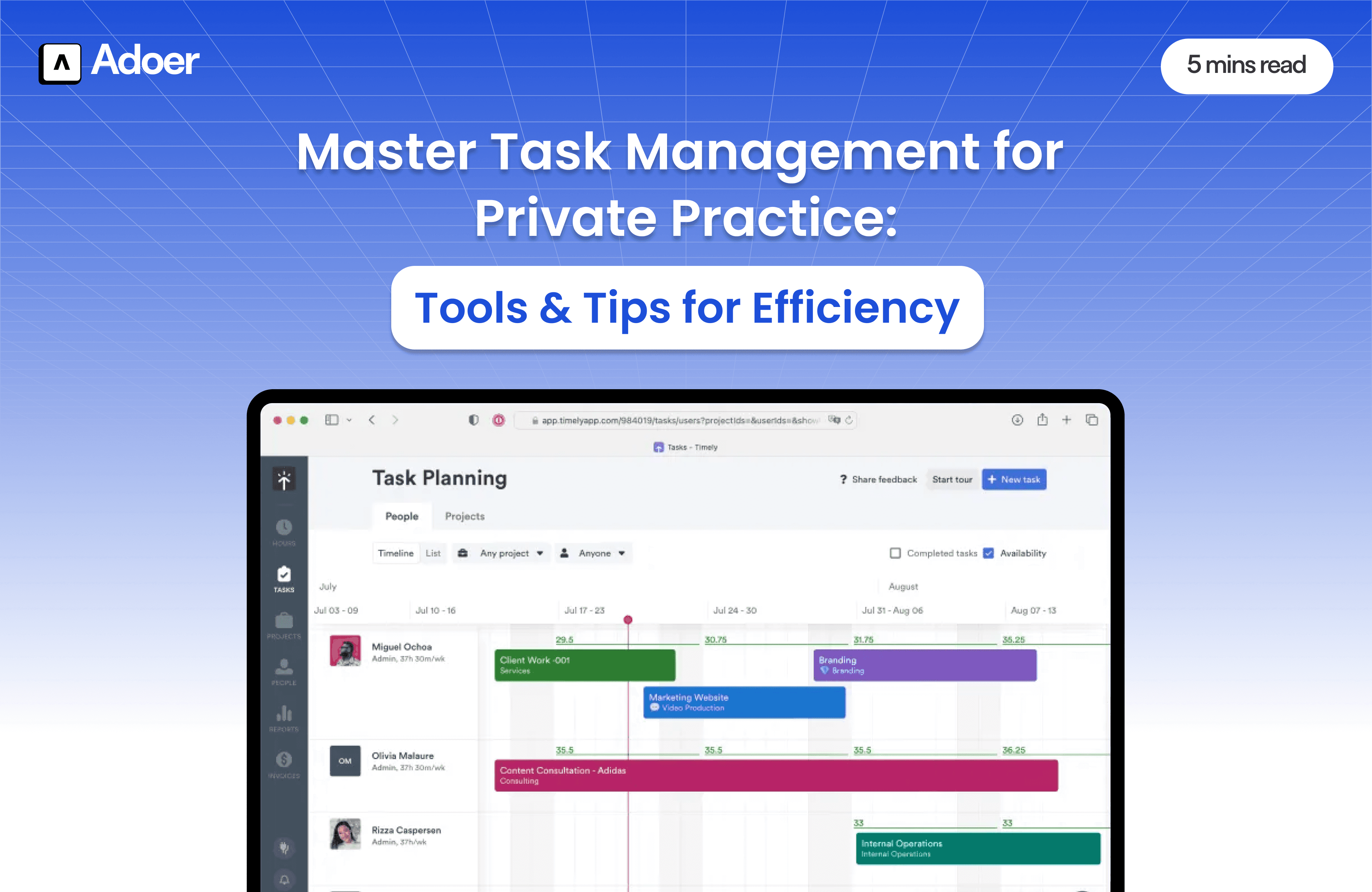Best Task Management Tools & Tips for Private Practice Success

Author
Shivang Khungar
Managing tasks effectively in a private practice can feel like juggling flaming hoops. Without a solid plan, appointments, patient records, and administrative work can quickly spiral into chaos. That’s where task management comes in it provides the structure and clarity practitioners need to thrive.
Imagine running a practice where:
Appointments are seamlessly scheduled and never overlooked.
Patient records are organized and easily accessible.
Administrative tasks are simplified, freeing up more time for patient care.
This article explores how effective task management strategies for private practice, from selecting the right tools to implementing actionable tips. Let’s dive in!
Why Task Management For Private Practice Is Essential
Task management isn’t just a routine, it’s the backbone of an efficient practice. Practitioners perform multiple roles, from patient care to administrative duties.
Without a system in place, tasks can pile up quickly, leading to:
Stress,
Errors, and
Unsatisfied patients.
Moreover, to maintain a thriving practice, task management is very helpful, to be precise, it’s absolutely vital. It brings order to the chaos and empowers practitioners to focus on what matters i.e. providing exceptional care.
Let’s explore the challenges of not having task management for private practice and the transformative benefits a robust system brings.
Common Challenges in Private Practice:
Overlapping Schedules
Double-booked appointments and scheduling conflicts create confusion, upsetting patients and leading to financial losses.
Furthermore, practitioners often face difficulty in manually keeping track of slots. As a result, this leads to unnecessary delays and frustration.
So, without automation, small scheduling errors can snowball into major disruptions.
Administrative Overload
Secondly, Billing, documentation, and compliance tasks often consume more time than patient care. This is especially common in small practices.
Administrative tasks are repetitive and time-intensive. Thus, leaving practitioners feeling exhausted. The constant back-and-forth between patient care and paperwork reduces overall productivity.
Lack of Task Prioritization
One of the most challenging parts of task management for private practice is to determine which tasks need immediate attention. As a result, the lack of clarity slows down operations.
Urgent tasks are often neglected because there’s no system to sort priorities. Over time, this creates a backlog that is hard to recover from.
Communication Breakdowns
Another major challenge is improper communication. Missed messages or miscommunication between team members result in unnecessary delays and misunderstandings.
Moreover, this not only affects internal coordination but also impacts patient satisfaction. Seamless communication is a must for a smooth workflow.
Burnout Due to Overload
Lastly, private practitioners often work long hours to meet patient and administrative demands. This leads to burnout.
Without a clear task management for private practice, the workload feels endless. Furthermore, burnout affects mental health and reduces the overall quality of care provided.
Benefits of Effective Task Management
Streamlined Scheduling Enhances Patient Satisfaction
With effective task management tools, scheduling becomes automated and error-free. Patients appreciate timely and accurate appointments.
Moreover, practitioners can quickly identify open slots and avoid scheduling conflicts. As a result, this fosters trust and certifies better service delivery.
Time Saved Boosts Productivity
Organized task management for private practice reduces the time spent on mundane tasks like paperwork and billing.
Thus, the extra time can be used to focus on patient care or strategic planning. Moreover, higher productivity translates into more growth opportunities for the practice.
Prioritized Tasks Keep Workflows Efficient
Task management systems help practitioners assign priorities effectively. Hence, ensuring urgent tasks are handled first.
This avoids backlogs and keeps the practice running smoothly. Furthermore, a clear structure allows teams to work with confidence and precision.
Improved Team Collaboration and Communication
Centralized task management for private practice tools makes it easy for team members to stay updated and aligned.
Practices that adopt such systems experience fewer delays and misunderstandings. Effective collaboration leads to better outcomes for both staff and patients.
Reduced Stress and Better Work-Life Balance
Lastly, task management for private practice not only organizes work but also reduces unnecessary stress. Practitioners can manage workloads without feeling overwhelmed.
Additionally, the reduced stress leads to improved mental well-being and allows for a healthier work-life balance. Moreover, happier practitioners provide better care to their patients.

Must-Have Features in Private Practice Task Management Software
To stay efficient, practitioners need tools that address specific pain points while boosting productivity. Let’s explore essential features that can revolutionize task management for private practice.
Calendar Sync and Task Planning
Firstly, a reliable tool must seamlessly sync calendars to simplify appointment scheduling and task planning.
Calendar Sync feature helps private practitioners align their schedules, avoiding:
Double bookings or
Missed commitments.
Moreover, with everything in one place, practitioners can focus more on patient care and less on organizational chaos. So, having a daily planner that updates real-time schedules makes managing tasks smooth and efficient.
Customizable To-Do Lists
A great task management for private practice tool provides flexible to-do lists tailored to the unique demands of private practices.
Customizable lists such as priority tags allow practitioners to categorize and prioritize tasks. Furthermore, breaking down responsibilities into smaller steps creates manageable workflows.
Thus, this structure helps tackle critical tasks first while postponing less urgent activities.
Motivational Features
Task management tools with motivational quotes or progress trackers help private practitioners stay positive and driven.
Small encouragements go a long way, especially during busy days filled with stress. Moreover, they boost morale and maintain focus when productivity wanes.
Additionally, a positive mindset is essential for private practitioners. Motivational elements embedded within a tool can keep them inspired and on track.
Workload Bandwidth Visualization
Knowing how much work is planned helps private practitioners avoid burnout and maintain a balanced workload.
Task management for private practice tools with bandwidth visualizations show daily capacity for:
Appointments,
Tasks, and
Administrative duties.
As a result, this allows practitioners to allocate time wisely and prevent over-commitment. Such insights are essential for improving time management and overall efficiency.
Focus Timer for Better Task Management
The ability to dedicate focused time blocks for tasks is a game-changer in private practices.
A focus timer encourages practitioners to commit undivided attention to one task at a time. Therefore, this improves output quality and minimizes distractions.
Furthermore, for private practitioners, this feature certifies that they can address patient care and administrative duties effectively without feeling overwhelmed.
Best Tools For Task Management For Private Practice
Choosing the right task management tool can make all the difference in a private practice's efficiency.
Let's take a look at some of the top tools for task management for private practice.
Adoer
Adoer is a powerful task management for private practice tool designed to simplify daily planning for private practice professionals. Its clean, intuitive interface is Personalized for morning, afternoon, and evening routines.
Moreover, Adoer helps you manage your tasks, appointments, and goals all in one place while offering a smooth, minimalistic experience.
Pros:
Easy-to-use, minimalistic design
Calendar sync for seamless scheduling
Includes a Focus Timer for improved productivity
Bandwidth tracking to prevent burnout
Features for saving links, audio notes, and documents
Cons:
Limited healthcare system integrations
Adoer focuses on task management for private practice by simplifying scheduling and task prioritization. Its design is tailored to maximize focus without distractions. Thus, making it ideal for busy professionals who want to stay organized with minimal effort.
Todoist
Todoist is a widely used task management for private practice app that helps you manage multiple projects and tasks. Its simple design makes it easy for private practice owners to set tasks, track deadlines, and stay organized across various practice operations.
Pros:
Simple interface
Task prioritization with color coding
Recurring tasks and reminders
Google Calendar integration
Team collaboration features
Cons:
Limited features in the free version make todoist alternatives a better choice.
Also, lacks healthcare-specific templates.
Todoist provides a solid structure for task management for private practice with a focus on ease of use and task prioritization.
Notion
Notion is a versatile task management for private practice tool that combines note-taking, databases, and project management in one platform. Moreover, for private practice owners looking for a more customized experience, Notion offers complete flexibility to create unique workflows.
From scheduling appointments to managing patient files, Notion is an all-in-one tool.
Pros:
Highly customizable templates
Combines task management with note-taking
Supports team collaboration
Extensive integration
Cons:
Steep learning curve
Might be too complex for simple task management
The notion is well-suited for private practices looking to manage multiple aspects of their business. However, with so many amazing notion alternatives, it is much harder to pick one.
Trello
Trello offers an easy-to-use task management for private practice system based on boards and cards. It helps private practice owners visually organize tasks by dragging and dropping cards between different columns.
Moreover, the visual organization helps to see tasks at a glance and stay on top of priorities.
Pros:
Visual task organization with boards and cards
Simple drag-and-drop interface
Team collaboration
Google Drive integration
Cons:
Limited reporting features
Also, lacks advanced task dependencies
Trello excels at organizing tasks visually. Thus, making it ideal for private practices looking to streamline their workflow and improve task visibility.
ClickUp
ClickUp is an all-in-one task management for private practice tool that is particularly popular for its feature-rich platform. For private practice owners, it offers the ability to manage everything from client tasks to team collaborations in one place.
Furthermore, it allows task creation, time tracking, and integrations with various third-party tools to fit the needs of a fast-paced environment.
Pros:
Customizable task fields and views
Integrates with Google Calendar, Slack, and more
Time tracking feature for efficient management
Gantt charts for project timelines
Cons:
The platform may feel overwhelming for new users
Moreover, some features are available only in higher-tier plans
ClickUp provides a robust platform for task management for private practice. Thus, offering customization and integrations for greater productivity and collaboration.

Common Mistakes To Avoid In Task Management For Private Practice
Task management for private practice can be tricky without the right strategy. Many private practitioners unintentionally fall into common pitfalls. Here are five mistakes to avoid for smoother operations:
Overloading Your Schedule
Packing your day with back-to-back tasks leaves little room for flexibility. As a result, this creates stress and reduces efficiency. Moreover, a well-structured plan that prioritizes key tasks is essential for effective task management for private practice.Neglecting Digital Tools
Relying solely on manual methods can slow down your workflow. Ignoring modern tools leads to disorganized schedules and missed deadlines. So, embrace task management apps designed for private practices to stay ahead.Not Delegating Tasks
Trying to handle every task alone can quickly lead to burnout. Delegation allows you to focus on high-priority activities. Furthermore, trust your team with responsibilities to reduce the burden.Lack of Consistent Review
Failing to review your task management process can result in repeated mistakes. A regular evaluation of your workflow ensures better results. So, refine and adjust your strategies as your practice grows.Ignoring Work-Life Balance
Lastly, focusing only on work tasks often leads to exhaustion and decreased productivity. Strike a balance between professional and personal responsibilities for long-term success.
Efficient task management is more than just checking items off a list. Avoiding these mistakes can pave the way for a seamless, well-organized practice. Let’s see how Adoer simplifies this process.
Why Adoer is the Best Choice for Task Management for Private Practice
When it comes to task management for private practice, Adoer is a game-changer. Designed for simplicity, Adoer keeps your day structured without overwhelming you.
Adoer’s clean interface makes planning tasks feel effortless. Moreover, the Focus Timer helps you stay productive by eliminating distractions. Unlike traditional planners, its minimalistic design makes every task visible without clutter.
You can sync your calendar and track daily tasks in one place. As a result, this eliminates the need for juggling multiple apps. Furthermore, a quick glance shows how busy or free you are at any time of the day.
Additionally, unique features like motivational quotes and smart UI transitions between morning, afternoon, and evening confirm a tailored experience. These subtle changes help practitioners stay in sync with their schedules.
Lastly features such as saving links, documents, and audio notes make it an even more powerful tool.
Choosing Adoer means opting for a task management for private practice tool that understands your needs.
To Conclude
Effective task management is crucial for running a smooth and successful private practice. The right tools and strategies can streamline operations, reduce stress, and enhance patient care. By prioritizing organization and efficiency, practitioners can focus on what truly matters, providing the best possible care for their patients.
Adoer is more than just a task management app - it’s your partner in transforming chaos into clarity.
Its clean design and user-friendly interface make it perfect for private practitioners who value simplicity and productivity. So, don’t let poor task management hold you back.
FAQs
What is the best way to prioritize tasks in private practice?
Use a digital planner like Adoer to organize tasks by urgency and importance.How do I choose the right task management tool for my practice?
Look for tools with intuitive designs, calendar syncing, and productivity-focused features tailored to professionals.Can task management tools integrate with existing practice management systems?
Many tools allow seamless integration with calendars and other platforms.


